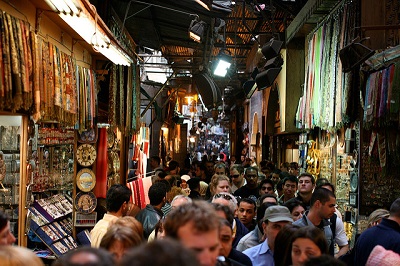Egypt launched its new e-commerce strategy in the presence of President Abdel Fattah el-Sisi this month during Cairo ICT 2017 – a trade fair for information and communications technology (ICT) organized in North Africa's most populous city.
The Egyptian government expects the strategy – designed in close collaboration with UNCTAD during the past two years – to double by 2020 the number of businesses in the country selling products and services online. Less than 18% of big companies and just 3% of small businesses currently do so.
"Egypt aspires to harness the power of e-commerce to help catalyze innovation, growth and social prosperity in the digital economy; support and enhance trade; enable the development of new businesses and services; and increase people's welfare," Minister of Communications and Information Technology Yasser ElKady said.
"The strategy is a solid foundation for stimulating e-commerce growth in Egypt throughout the coming years," Minister ElKady said. "I wish to express my appreciation for all the efforts and dedication by UNCTAD."
The ancient nation has the potential to be one of the Arab-speaking world's biggest e-commerce markets. Some 60% of the population is aged under 30 and increasingly tech savvy. And more than one-third of the country's 90 million inhabitants is connected to the Internet.
Yet online commerce has struggled to take root on the banks of the Nile, where less than 3% of those connected to the web use it for shopping.
Part of the reluctance to do business over the Internet comes from entrenched social and cultural preferences for cash payments.
Along with strengthening Egyptians’ trust in online payments, which will require more effective e-commerce laws and regulations, UNCTAD's analysis highlighted the need to roll out higher-speed broadband through the country.
Without a fast and reliable connection, businesses and customers will struggle to connect to e-commerce platforms and e-marketplaces, and companies will find it difficult to deliver digital services, such as data analytics and digital marketing.
And e-commerce won't be able to take off unless Egypt strengthens logistics in the sector, especially in rural and remote areas. Even if more goods are purchased online, they still need to be delivered quickly and safely to people's homes and businesses.
So the strategy aims to:
Improve the supply of high-speed broadband, especially in rural areas
Modernize Egypt's postal authority
Bolster the legal and regulatory framework for e-commerce
Build trust in online payments
Strengthen training and apprenticeships in areas like online store management, digital marketing and data analytics
Encourage government employees to use e-procurement for low-value goods such as office supplies
While devising the strategy, UNCTAD and the Ministry of Communications and Information Technology worked with the World Bank and other United Nations agencies, as well as Chinese e-commerce giant Alibaba. Funding was provided by US multinational financial services corporation Mastercard.
As the UN focal point for the development aspects of science, technology and innovation, UNCTAD gives top priority to helping developing countries use ICTs to participate more effectively in the global economy, and ultimately improve the lives of their people.
In addition to national e-commerce strategies, UNCTAD helps developing countries to measure their readiness to take part in the digital economy and to assess the effectiveness of their ICT policies.



